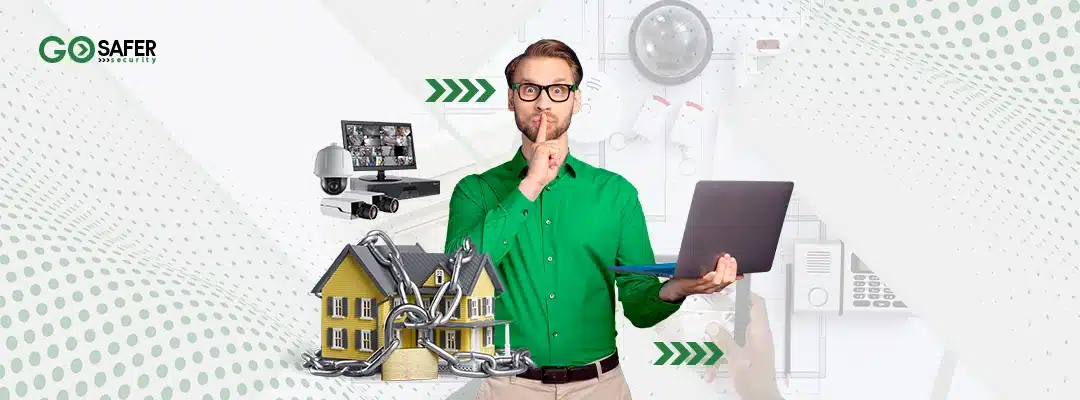Table of Contents
ToggleWhy Home Security Is More Than Just a Burglar Alarm
We often think of home security systems as tools to ward off burglars, but there’s way more to it than that. Think about it—these systems now detect fire, carbon monoxide, water leaks, and even monitor who’s knocking at your door. In today’s world, your home security system is less about paranoia and more about peace of mind.
Plus, here’s a fun bonus: many insurance companies offer discounts if your home is protected by a verified system. It’s like getting rewarded for being cautious—what’s not to love?
How Home Security Systems Work
Sensors and Smart Devices Explained
At the heart of every good system are sensors—tiny, silent protectors that watch doors, windows, and rooms for any suspicious activity. Then you’ve got devices like smart cameras, smoke detectors, and even glass-break sensors joining the party.
The Role of Control Panels
This is the “brain” of your system. Modern control panels are touchscreen-based, sync with your smartphone, and can control not just your alarms—but your entire home. Lights, thermostat, locks? All under one roof (pun intended).
Cloud-Based vs Local Storage
Cloud storage is convenient, but it comes with ongoing costs and security risks. Local storage offers more privacy, but might be limited in space or accessible only in-person. Choose wisely depending on your comfort level with data in the cloud.
Professional Monitoring Services – Worth It or Not?
24/7 Response – But at What Cost?
Let’s be real—having someone watch your back 24/7 sounds amazing, right? But that peace of mind comes with a monthly fee (usually $20 to $60). And here’s the kicker: not all services respond as fast as they claim.
Response Time vs Real-Time
Some providers only dispatch after you confirm an alert, which delays things. Others act immediately, but that might mean more false alarms and fines. It’s all in the fine print, which, let’s be honest, most of us skip.
Hidden Contract Clauses to Watch For
Early termination fees. Equipment lease traps. Price hikes after year one. Sound familiar? Yeah, always read the terms before you sign anything.
DIY Security Systems – The Good, The Bad, and The Ugly
Cost-Saving Benefits
DIY systems are budget-friendly and easy to install. Most come with peel-and-stick sensors, mobile app setup, and no contract. Sounds perfect, right?
Limited Support During Emergencies
But here’s the catch—you’re on your own in an emergency. No monitoring service means no police dispatch unless you call them. Yikes.
False Sense of Control?
You may feel secure, but unless you’re glued to your phone 24/7, you might miss something critical. That’s a risk only you can evaluate.
Wired vs Wireless: Which One Should You Choose?
Wired systems are reliable but harder to install. Wireless is flexible but depends on batteries and Wi-Fi.
Battery Life Concerns
Imagine your system failing during a blackout or if you forget to change batteries. That’s a real buzzkill—and a real risk.
Network Reliability Issues
Wireless systems are vulnerable to jamming, interference, and poor internet signals. If your Wi-Fi sucks, so might your security system.
The Real Deal with Motion Sensors
Sensitivity Adjustments
A good motion sensor can tell the difference between an intruder and your golden retriever. But if it’s not set right, expect a few jump scares at 3 a.m.
Pet-Friendly Options
Pet-immunity settings are a lifesaver. Just make sure they’re adjusted for your fur baby’s size. No one wants their dog triggering daily false alarms.
Control Panels: More Than Just a Fancy Keypad
Today’s panels are like a mission control center for your home. Some even connect with Alexa or Google Home for voice commands.
User Access Control
You can assign unique codes to family members, guests, or service workers. This gives you full control—and a digital trail of who entered when.
Cameras Everywhere: Do You Really Need Them All?
More cameras ≠ more safety. Be strategic.
Indoor vs Outdoor Cameras
Outdoor cameras should be weatherproof and tamper-resistant. Indoors, choose models with privacy shutters if you’re concerned about being watched.
Privacy Implications
Where there’s data, there’s risk. Always secure your cameras with strong passwords and two-factor authentication.
Home Automation and Security Integration
This is where things get cool. Imagine your lights turning on as you approach your front door. Or your thermostat adjusting automatically when you leave.
Voice Assistants and Control Hubs
These are great, but they can be a double-edged sword. One security flaw in your Alexa, and your entire system could be vulnerable.
Common Marketing Myths Debunked
Let’s bust a few bubbles.
- You don’t need the priciest package.
- DIY isn’t always “easy.”
- One size never fits all.
What Home Security Companies Don’t Tell You
Watch out for:
- Data collection: Your system might be feeding user data to third parties.
- Shady contracts: Price hikes, cancellation fees, or renting your equipment.
- Customer support nightmares: Good luck getting someone on the phone when your alarm won’t stop screaming.
Costs to Consider Beyond Installation
- Monthly fees
- Maintenance
- Replacement parts
- App subscriptions
How to Choose the Right System for Your Home
Start with a home risk assessment. Are you in a high-crime area? Travel a lot? Have pets? Customize your system accordingly.
Real-Life User Stories and Case Studies
A couple in Texas caught a burglar thanks to a smart doorbell. A California mom stopped a break-in while on vacation. But a New York tenant realized his DIY setup didn’t notify police when he was away. True stories, real lessons.
Final Checklist Before You Buy
- ✅ Set your budget
- ✅ Decide between DIY vs pro
- ✅ Research brands
- ✅ Check contract terms
- ✅ Look for third-party reviews
Conclusion
Home security isn’t just about alarms and cameras. It’s about being informed, staying protected, and feeling confident in your decisions. By understanding the fine print and knowing what to look for, you’ll build a system that actually works for you—not just one that looks good in a brochure.







